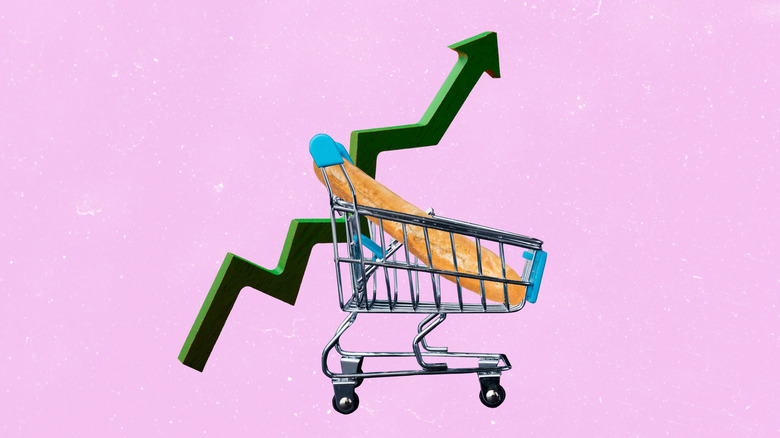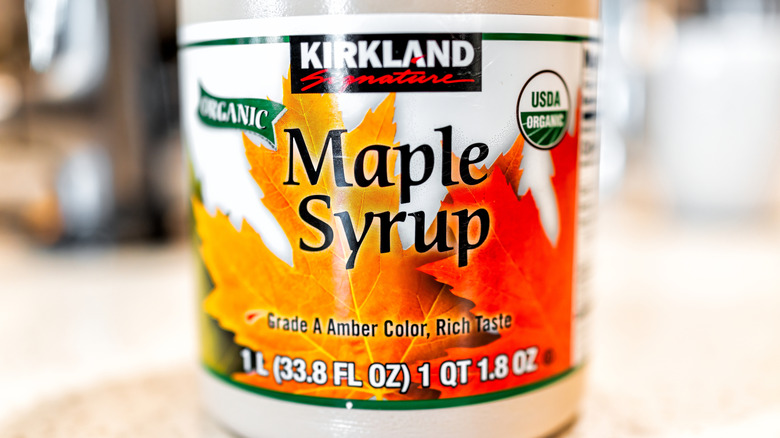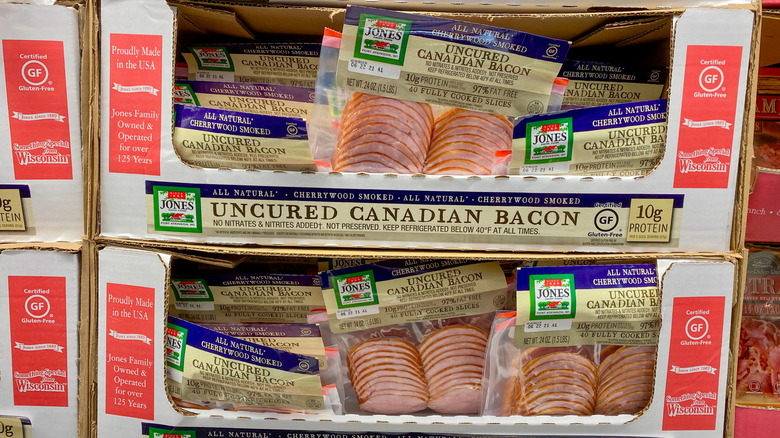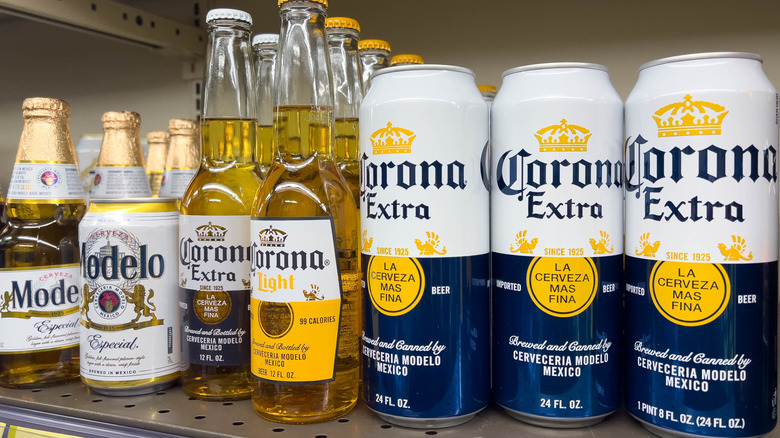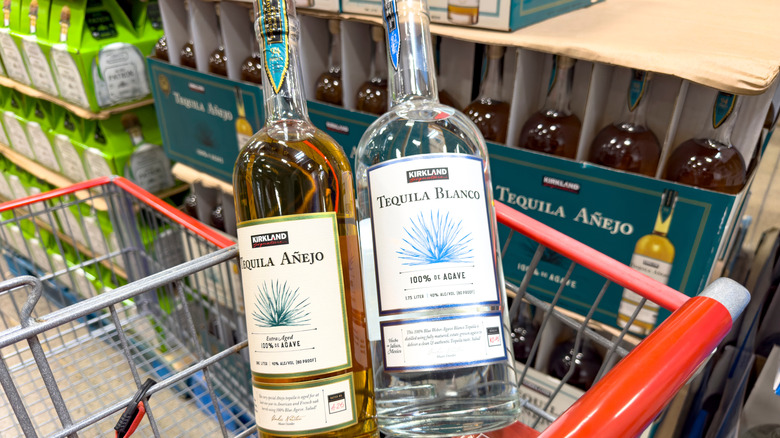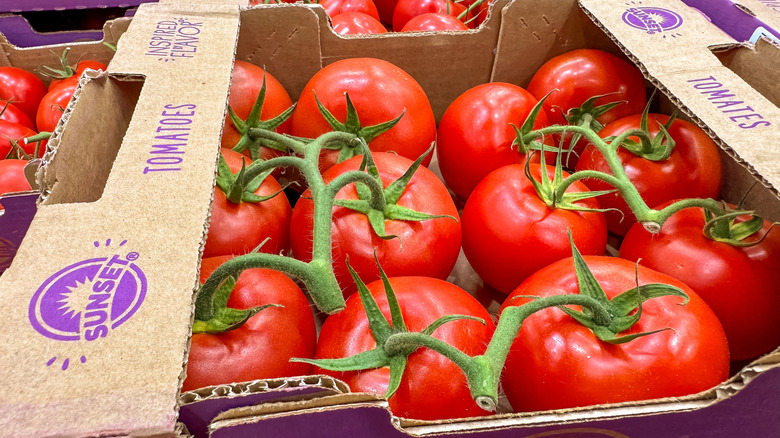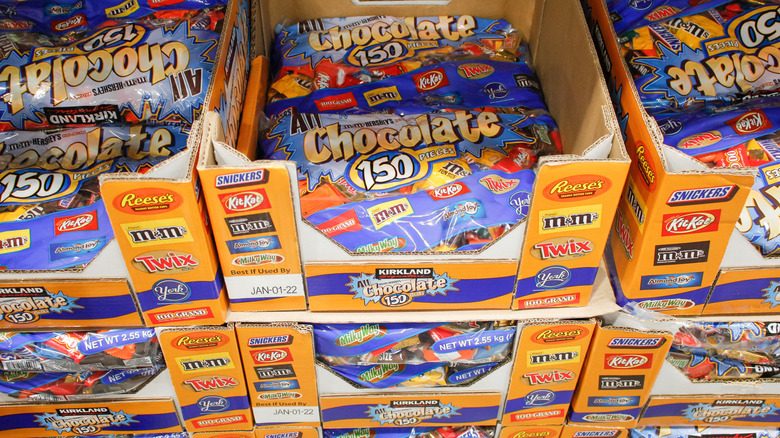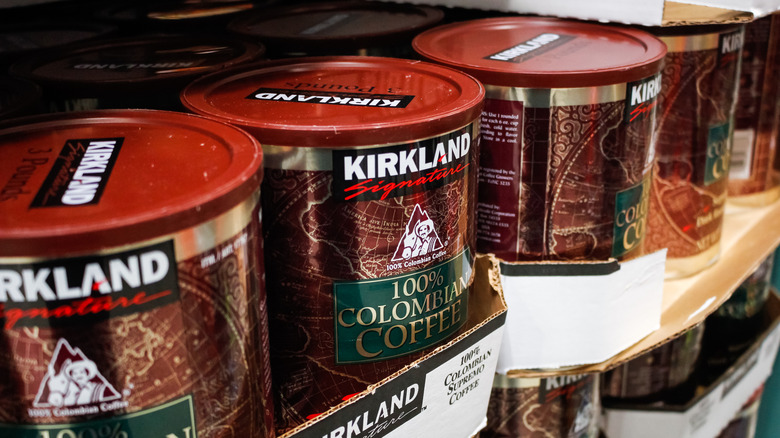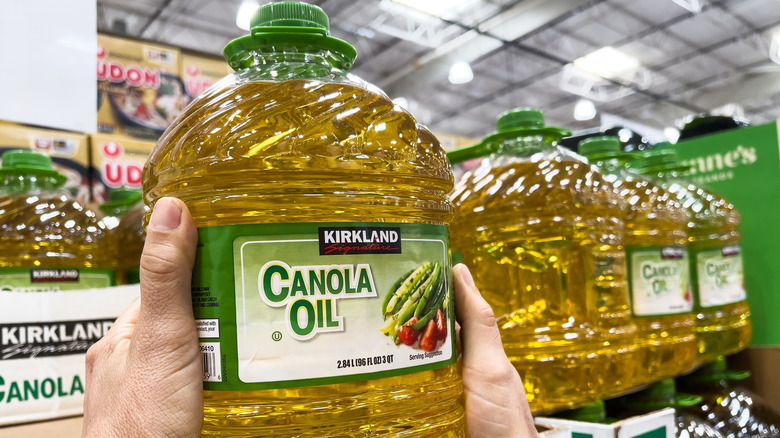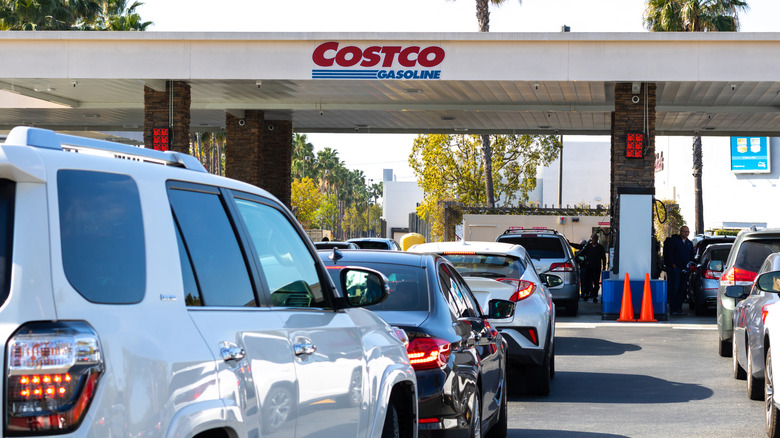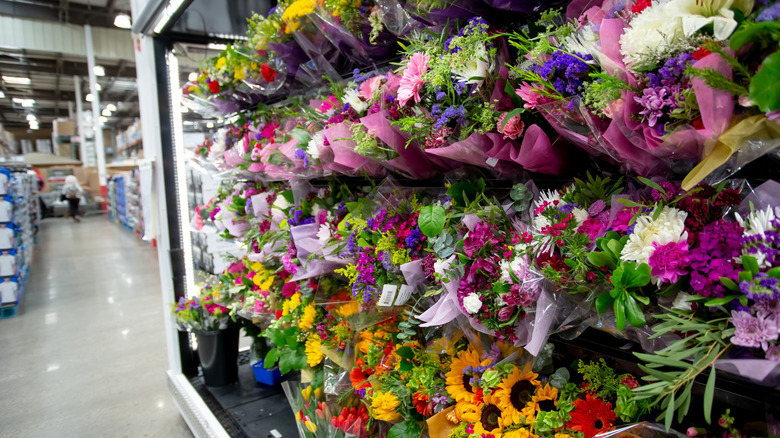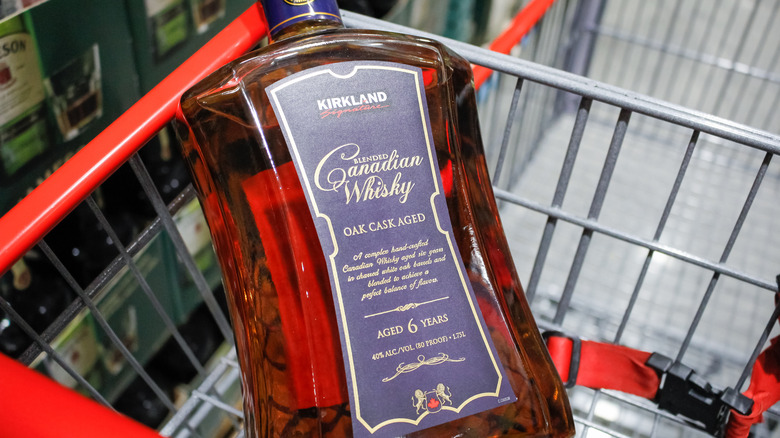14 Costco Groceries That Are Going To Shoot Up In Price
The last few years have left the economy in a pretty shaky state, with food prices, and the customers who buy them, bearing the brunt of the cost. Between 2020 and 2024, food prices increased by 23.6%, according to the United States Department of Agriculture Economic Research Service – and things may be about to get even more expensive. President Trump's tariff announcements in the first few months of 2025 have created increasing uncertainty about how much people's favorite items are going to cost. Tariffs on Chinese goods and upcoming ones on Canadian and Mexican imports have prompted a trickle-down impact on retailers like Costco, which rely on interconnected supply chains and hundreds of products from countries around the world.
Unfortunately, a lot of those products are about to get more expensive. The amount of everyday Costco products that come from companies affected by tariffs is pretty incredible, with everyday basics like beef, pork, frozen fruit, and tomatoes set to get way more expensive. Items that are slightly more pricey, like alcohol, may also become totally unaffordable for the everyday customer. Plus, the very thing you need to get to the store in the first place — gas — could also take up way more of your paycheck. It won't make for easy reading, but it's important for you to know where your wallet is being hit.
1. Maple syrup
It's probably no surprise that if the tariffs imposed on Canadian goods go ahead, Costco's maple syrup will be first on the list of items that will increase in price. The vast majority of maple syrup that comes out of Canada is made in Quebec, with millions of bottles each year making their way across the border to the U.S. "That maple syrup is going to become more expensive. And that's a direct price increase that households will face," Thomas Sampson, an associate professor of economics at the London School of Economics, told BBC. For Costco shoppers, that means that its Kirkland Signature Organic Pure Maple Syrup, which is extracted by Canadian farmers, will likely shoot up in price.
That's not the best news in the world for an item that's not exactly cheap as it stands. Kirkland Signature Maple Syrup is currently priced at $14.99 for a 33.8 oz bottle (based on prices for Costco stores in Los Angeles County). If 25% tariffs are imposed, the difference will likely be swallowed by the customer, and we could see the cost of a single bottle going up to almost $20.
2. Avocados
Mexican avocados are big business. In the year from July 2023 to June 2024, the U.S. imported over 2.4 billion pounds of Mexican Hass avocados, according to a report by Bluebook. A huge amount of these ended up in states in the south of the country like California and Texas, which are large consumers of everyone's favorite big-seeded fruit. As you might expect, Costco is a major purchaser of Mexican avocados, which it then sells in its U.S. stores — and you can expect them to get more expensive if the tariffs on Mexican goods go through as planned.
Unfortunately, some Costco shoppers have already reported that avocado prices are already on the rise in their local stores, although it remains to be seen whether this is a permanent shift or just a case of a single store taking preemptive action. The problem with the tariffs for avocados in particular is that the U.S. doesn't currently have the capacity to produce the fruit at a rate that will satisfy customer demand. Additionally, any impact on avocado imports from Mexico may affect a proportion of U.S. jobs that are currently related to the industry — the number of which stands at well over 42,000. None of this bodes well for your guacamole.
3. Canadian pork
Canadian pork is big business, and the amount that's imported from Canada to the U.S. is pretty huge. Each year, a huge quantity of meat and millions of piglets are sold from Canada to the U.S., with the subsequent products sold benefitting both the Canadian farmers and the American supermarkets. Sadly, though, any tariffs would have a big and immediate impact on pork prices at Costco, with any Canadian-made pork items in its Kirkland line shooting up in price.
Sadly, too, many pork prices have already started to see an increase, as Canadian farmers have had to tackle the uncertainty by negotiating their contracts with their U.S. buyers. "The market for our pigs is in the USA, not here in Canada," explains Stewart Skinner, an Ontario-based pig farmer, to Reuters. As a result, these farmers have had to take preemptive action to protect their business interests — and you can guarantee that those new prices are going to be reflected on your grocery bill.
4. Modelo and Corona beer
It probably comes as no surprise that Mexican-made beer is going to be heavily affected by tariff introductions. The problem is that those beers are pretty darn popular. "The most popular beer brand in the entire country right now is Modelo," says Northeastern University's assistant teaching professor of history Malcolm Purinton to Northeastern Global News. Modelo Especial has been outpacing its second-place competitor Bud Light in sales since 2023, and both Modelo and Corona have built brands that are driven by a sense of specificity and coolness.
Purinton notes that things likely won't change very much soon in terms of how much people want these beers. "The thing is the demand isn't going to go away, but the costs are going to go up," he says. So both of these beers, which are stocked at Costco, will see a pretty much immediate price rise. You'll also likely see other beer brands like Pacifico suddenly increasing in cost. Although you can switch to other pilsners or pale lagers to replace Modelo and Corona, you may just have to pay that bit extra.
5. Canadian beef
Beef prices aren't exactly low at the moment, and American consumers have had to deal with increasingly high prices for their ground beef and chuck steak. Well, unfortunately, things are about to get that much more expensive at Costco. The tariffs will cause an immediate price hike on Canadian-produced beef, according to beef import consultant Bob Chudy. "If it goes through anything like threatened, it will definitely push U.S. beef prices up significantly higher," he says to Reuters.
The problem is that the U.S. buys beef from Canada at a relatively early point, with Canadian cattle coming over to be fed and processed on the other side of the border. As such, unless the U.S. cattle industry can significantly increase its capacity to produce new livestock, customers will be swallowing the cost. As well as this, Costco customers will likely see price increases on any Mexican-produced or Mexican-raised beef. On February 1, cattle imports resumed from Mexico after a temporary halt due to potential pest contamination. As the U.S. usually imports more than a million cattle per year, it's a fairly hefty chunk of the amount of beef in stores.
6. Tequila
Although tequila is a more predictable price increase, that doesn't make it any more disappointing. Tequila is one of the products that will see an immediate price rise due to tariff action, with Costco's Kirkland brand tequila about to get a whole lot more expensive. This tequila is made by Corporate Distillery Santa Lucia, S.A. de C.V., a manufacturer based in Tesistán, Mexico. It doesn't matter which variety you buy, either. Whether you're going for blanco, reposado, or añejo, things are gonna get more expensive, and as these bottles are already priced at around $20 or more, it's gonna cost a pretty penny to drink them.
The problem is that there's really no way for the U.S. to address this, due to the nature of tequila production. Production of the drink is protected, as is the tequila name itself, and for the beverage to be called tequila it has to be made in five specific Mexican states. Additionally, agave growth can take up to 10 years before the plants reach the point when they're ready to harvest, and so even if U.S. producers could call their products tequila, they wouldn't be able to ramp up production any time soon.
7. Tomatoes
The upcoming tariffs will affect some of the most basic items in your fridge that you buy from Costco, and tomatoes are one of them. The U.S. relies heavily on imported tomatoes from Mexico, especially in the colder months when the vegetable can't grow as well on the American side of the border. Over the years, fruit and vegetable imports from Mexico have increased steadily, and produce producers just don't have the capacity to swallow the cost. "The fresh produce industry has always worked on razor-thin margins, so a 25% tariff is not something that could be absorbed either by the growers or the producers of the fresh fruits and vegetables that Americans have come to enjoy on a year-round basis," says SunFed's Matt Mandel to AZPM.
The amount of tomatoes that come to the U.S. from Mexico is pretty staggering, too. In 2023, approximately 1.8 billion kilograms were imported to the U.S., coming in at a value of over $2.8 billion. Although Costco may bear the brunt of the price increase in the first instance, it'll soon pass on to you and the cost of your homemade tomato soup.
8. Frozen fruit
Do you enjoy frozen strawberries in your morning mixed berry smoothie? Well, get ready for that smoothie to be a lot more expensive to make. Fruit is about to get way more expensive at Costco, and frozen fruit like strawberries and pineapples will face significant price rises. Although the U.S. is a large producer of fruits like strawberries, it also imports a significant amount of its produce from Mexico. A lot of these fruits then end up frozen and sold in Costco.
This price increase likely won't be exclusive to frozen fruit, either. Many types of fresh fruit may also see a price rise, especially those that are grown in sunnier climates but available year-round, as they're more likely to come from another country. To try and mitigate this, it may be worth trying to prioritize fruits that are produced primarily in the U.S., like grapes, oranges, or apples. Unfortunately, though, due to the complex matrix of grocery supply chains, there's no guarantee that the ones in your Costco didn't come from over the Mexican border.
9. Canadian and Mexican candy
Some of your sweetest treats may well begin to get more pricey at Costco. Both Canadian and Mexican candy will start to become more expensive in the big-box retailer, thanks to tariffs increasing prices by a solid 25%. Chocolate may be especially affected from the Mexican side, and you may also see chocolate-flavored drinks that are stocked in Costco stores also see a hefty hike.
From the Canadian side, the effect on candy may be slightly more wide-reaching than you think. Canada is the biggest supplier of confectionery items to the U.S. However, the U.S. also imports a massive amount of sugar from Canada, meaning that even confectionery made in the U.S. could see a big price increase. What's more, we may see U.S.-made confectionery getting more expensive, as the amount of candy from Canada decreases. "I would expect there would be a significant decline in exports of candy products to the U.S. (from Canada)" if tariffs are to go ahead, says agriculture and food economic consultant Sebastien Pouliot to BNN Bloomberg.
10. Coffee
Sometimes, even the threat of tariffs can produce results that don't look like they're gonna be reversed. If you need any proof of that, check out what's happening to coffee prices. Trump threatened tariffs on Colombia at the start of the year, which would have resulted in similar price hikes as the ones on Canadian, Mexican, and Chinese goods. The threat was averted, but unfortunately it seems like the damage had already been done. "When President Trump even makes threats about tariffs, the minute you introduce uncertainty into a global trade system, and that's what global trade is, things are going to get a little crazy," explains Trade Facilitators President Dan Gardner via CNN.
In this case, "things" are coffee prices, which have shot up, and are due to continue to rise. Some of Costco's flagship coffee products, like its Kirkland Signature 100% Colombian Coffee, are produced in (you guessed it!) Colombia. You can expect to see this, and other Colombian-made coffees, get even pricer at Costco — and what's more, you may even forget why. "People will have trouble separating tariffs that didn't even pan out, versus what were the underlying price dynamics of coffee even before the Trump administration," says economist Tyler Schipper.
11. Cooking oil
When tariffs strike, you start to truly see how many products that you use every day are made elsewhere. Cooking oil is just one of those products, and Costco cooking oil is about to get a lot more expensive. The U.S. is a key market for Canadian cooking oil producers, with the latter country supplying almost 35% of all cooking oils available in America. Well over $4 billion of product crosses the border every year, with Indonesia, the second-biggest supplier, covering way less of the amount of cooking oil circulating in the country (just over 25%, for the number crunchers out there).
With such a large quantity of cooking oil being supplied by Canada, it's only a matter of time until Costco's prices are affected. Kirkland Signature Canola Oil, for example, is partly produced by Canadian manufacturers. Although we guess you could get around these tariffs by going for some of Costco's more clearly sourced products, like its olive oil (which is generally of Italian origin), this is hardly a cost-effective way of approaching things and will probably see you spending more money overall. You may just have to swallow the cost, folks.
12. Gas
Costco is a common road trip pit stop, but not necessarily for folks to pick up bulk-buy items. Instead, people tend to stop there during a long trip because it's got famously low gas prices. Costco manages to keep the cost of its gas so low because it subsidizes the cost with its membership fee, allowing us all to fill up our tanks for way less (even though we're still spending money elsewhere by paying for that exclusive Costco card).
However, the days are numbered for Costco's gas prices, thanks to the upcoming tariffs. The U.S. is a target market for oil coming both from Canada and from Mexico. The tariff action is predicted to cause a diversion of these oil products to different markets, which don't have such pricey extra costs. As a result, U.S. retailers like Costco will inevitably have to raise their prices in order to avoid being stung. "Depending on where you are in the country, it could be up to another 15 cents a gallon," says Lipow Oil Associates analyst Andy Lipow to CNN. That's just in the short-term, too: Who knows what will happen in the long run?
13. Flowers
Planning on buying a beautiful bouquet for your beloved from Costco? Be prepared to hand over a pretty penny, thanks to the tariffs. The U.S. is a big export market for Canadian fresh-cut flowers. In 2023, for example, the country exported $110 million of cut flowers, and $109 million of these went to the U.S., constituting 99.5% of all Canadian flowers sold to other countries.
The size of the market in the U.S. is significantly larger than this, but it's pretty likely that the combination of tariffs and market shock will lead to a price spike. The good news is that the U.S. imports flowers from several other markets, with Colombia and Ecuador being the market leaders, thanks to their climate being particularly suited to growing flowers. The bad news is that the U.S. domestic production ability isn't particularly competitive with these countries — and so if more tariffs are announced, it could spell even greater price rises.
14. Canadian whisky
Canada produces some pretty good whisky, and the whisky it supplies to Costco is pretty good. Kirkland Signature Blended Canadian Whisky is renowned for being close in taste and smell to Crown Royal, and its six-year aging process gives it a smooth finish and a nice complexity. If you want to enjoy that in the future, though, you're gonna have to pay way more, as Canadian whisky is about to shoot up in price.
Canadian whisky, like other Canadian products, will likely be getting way more expensive due to tariff action. Canadian whisky is similar to tequila, in that it can't be produced anywhere else in the world — to call it Canadian, it has to be made in Canada (as you might expect, right?). The good news for whisky lovers is that the American whisky market is pretty darn developed, so you likely won't struggle too much to find a tipple that you prefer. Canadian whisky can be used fairly interchangeably with rye whisky, so you can make a pretty straight swap between the two. However, if you've fallen in love with the taste of Kirkland Signature's Canadian blend, you're gonna have to stump up.
